He brought world attention to his sinking island nation. Now he wonders if he can go back
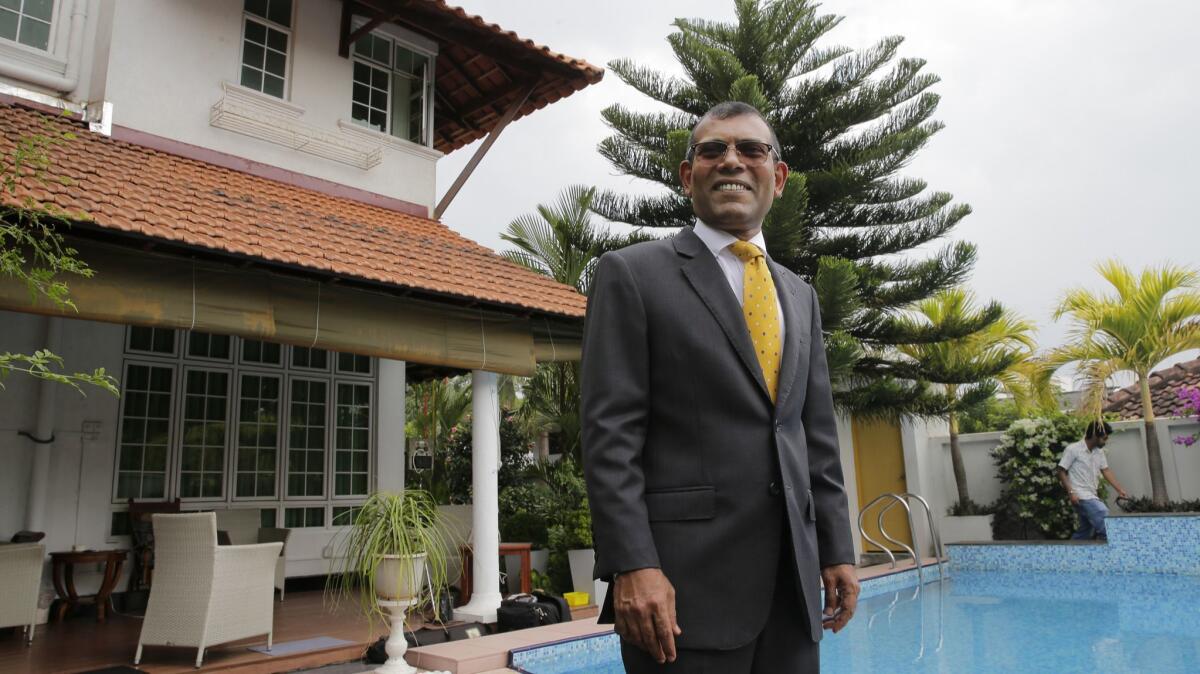
- Share via
Reporting from Colombo, Sri Lanka — Mohamed Nasheed, the former president of the Indian Ocean archipelago of the Maldives, is intent on ending his exile and going home. But when he considers the practicalities, his thoughts turn to another politician who staged a defiant return to his country.
“They shot him on the tarmac,” Nasheed said of Philippine opposition leader Benigno Aquino, killed in 1983 as he arrived in Manila to challenge dictator Ferdinand Marcos.
Nasheed is not known for subtlety. As president, he once donned scuba gear and held a Cabinet meeting underwater to illustrate how climate change and rising sea levels threatened to swallow the low-lying Maldives. He announced plans to purchase land in another country — Sri Lanka, or perhaps Australia — in case encroaching waters made his half-million compatriots homeless.
Still, it is not easy to dismiss Nasheed’s bleak assessment of the risks he would face in the Maldives, Asia’s smallest country, where a constitutional crisis holds strategic implications for the rest of the continent.
A necklace of 1,200 coral islands 300 miles from the southern tip of India, the Maldives is famed for pristine beaches and luxury resorts. But its politics are ugly and turbulent. Abdulla Yameen Abdul Gayoom, the current president, has thrown hundreds of political opponents and activists in jail and is accused of widespread human rights abuses in his consolidation of power.
In 2015, a court convicted Nasheed — the president’s main rival — under anti-terrorism laws of having ordered the arrest of a judge while in office, a case that the United Nations and human rights groups said was politically motivated. He was barred from running for office and began serving a 13-year prison sentence.
In 2016, after being released on a temporary basis to receive medical care in Britain, he was granted political asylum there and stayed.
In February, the Supreme Court in the Maldives annulled his conviction, along with those of eight other dissidents, ruling their trials had been unfair. Yameen responded by having two justices imprisoned and the convictions reinstated.
Then Yameen imposed a 45-day state of emergency and sent troops to block opposition lawmakers from entering the parliament building when it looked like they might start impeachment proceedings against him.
The moves were aimed at clearing Yameen’s path to victory in elections scheduled for September. Yameen has shrugged off condemnations from the United States and Europe with the help of diplomatic support and massive loans from China, whose growing reach in South Asia poses a direct test to India, the regional power.
Nasheed, who leads the main opposition party from exile, said he plans to challenge Yameen, and that if he’s allowed to run, “hands down, we can win it.” On Monday, the United Nations human rights committee concluded that Nasheed’s conviction was arbitrary and the Maldives must “restore his right to stand for office.”
But first he must go home and face down the threat of arrest — or worse.
“I would advise him against going back right now,” said Ahmed Shaheed, who served as Nasheed’s foreign minister.
“As a politician he understands the importance of returning. But I think certain things have to be in place before someone puts his or her life on the line.”
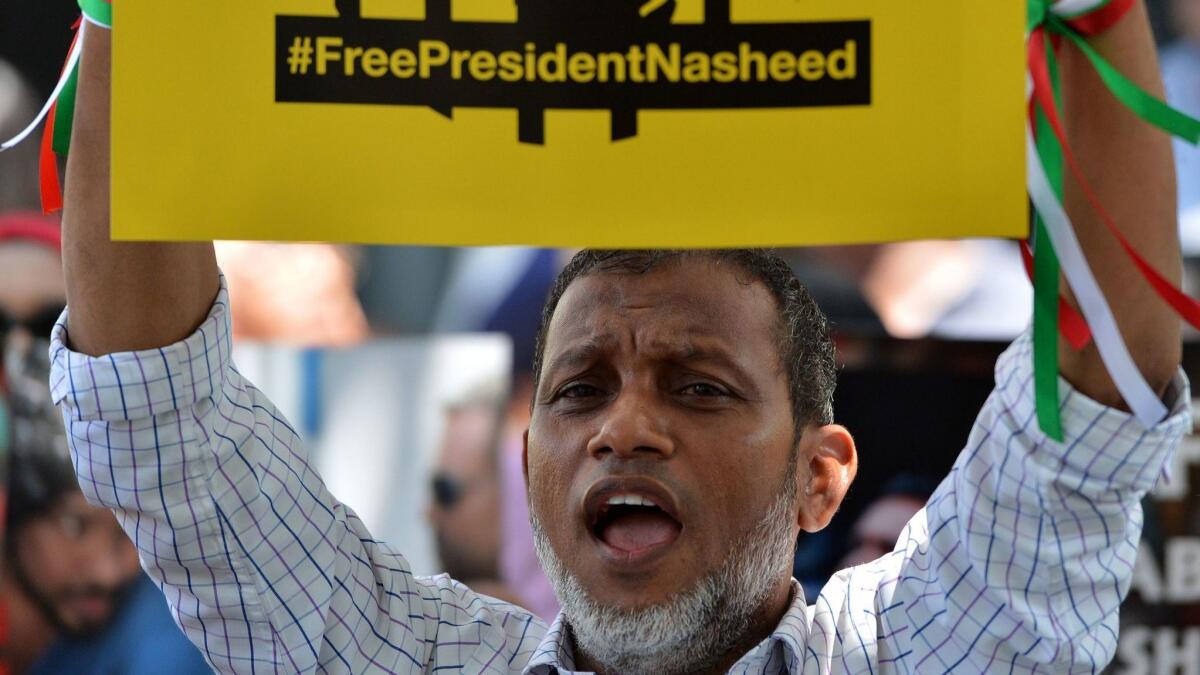
The 50-year-old Nasheed, a former journalist known in the Maldives as “Anni,” became a hero to many by leading the fight against the 30-year dictatorship of Maumoon Abdul Gayoom. He was arrested more than a dozen times, tortured twice, missed the births of his two daughters while incarcerated and confined for 18 months to a shed the size of an outhouse before winning the country’s first multi-party elections in 2008.
He gained international stature at a 2009 climate summit in Copenhagen, where he championed the cause of small, vulnerable island nations demanding that major polluters like the United States, China and India commit to reducing their carbon emissions. A 2012 documentary, “The Island President,” captures a diminutive Nasheed badgering officials from bigger nations with the earnest tenacity of a college debate captain.
Back home he pledged to make the Maldives carbon-neutral within a decade, emancipated state-controlled media and promoted low-impact ecotourism, allowing more Maldivians a share of the country’s tourism revenue.
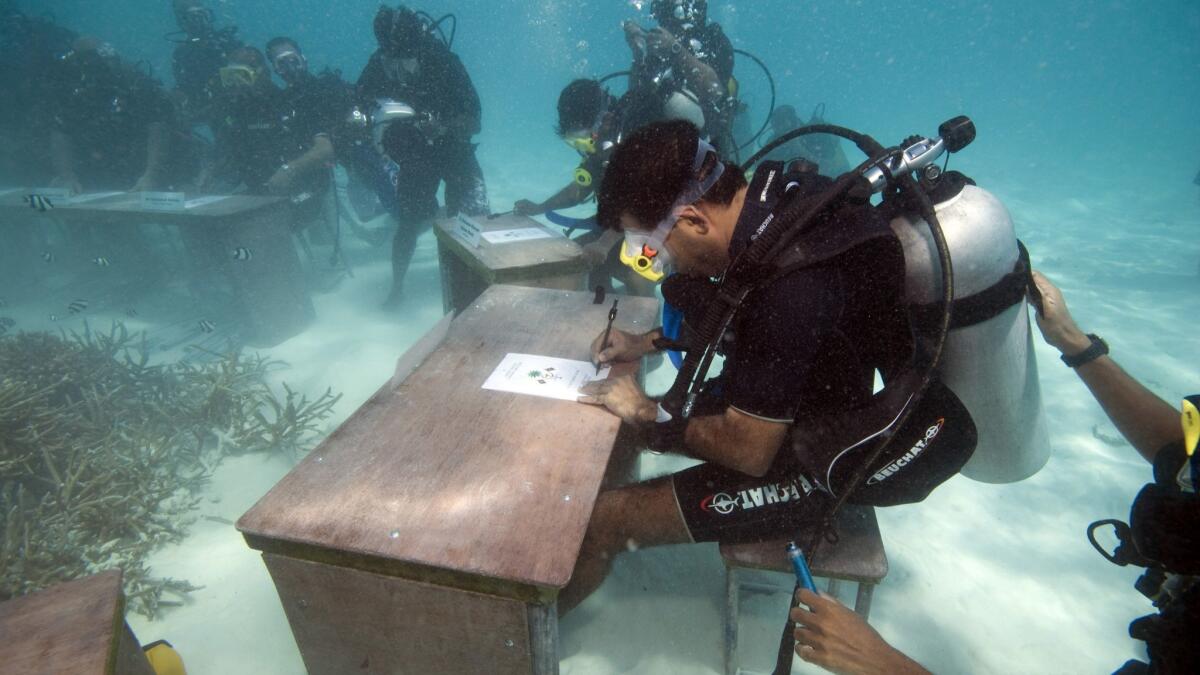
But he faced mounting street protests and obstruction from Gayoom loyalists. Then, one morning in 2012, barely three years into his term, a group of army officers held him at gunpoint, he said, and forced him to resign. (A national commission concluded that Nasheed left office voluntarily, although his supporters argued the panel ignored crucial evidence.)
In 2013, Nasheed ran for president again, narrowly losing to Yameen, the former dictator’s half-brother, in an election marred by delays and irregularities. Two years later came his conviction and imprisonment.
His wife and two children joined him in exile in Britain. With his younger daughter due to finish high school in June, he began plotting to return to the Maldives in time for elections this fall. He now spends much of his time in Colombo, the Sri Lankan capital and longtime hub of the Maldivian opposition. In an interview here last month, Nasheed said he was counting on pressure from the U.S. and other countries to force Yameen to allow a free election with international observers.
“It’s difficult now to see a free and fair election happening … but things can change very rapidly,” Nasheed said at a spacious house that serves as his de facto headquarters, looking as trim and youthful as in his activist days except for the gray hair at his temples.
Friends said he maintained hope even with most of his allies jailed or in exile.
“His success in life and politics has been his determination to stay on course,” Mohamed Aslam, who served as climate coordinator in Nasheed’s government, said by phone from the Maldivian capital, Male, where he was marooned because authorities had confiscated his passport.
“He’s very determined and I think a lot of us do find courage from his optimism. It’s at times like this that we cannot simply start thinking it is impossible.”
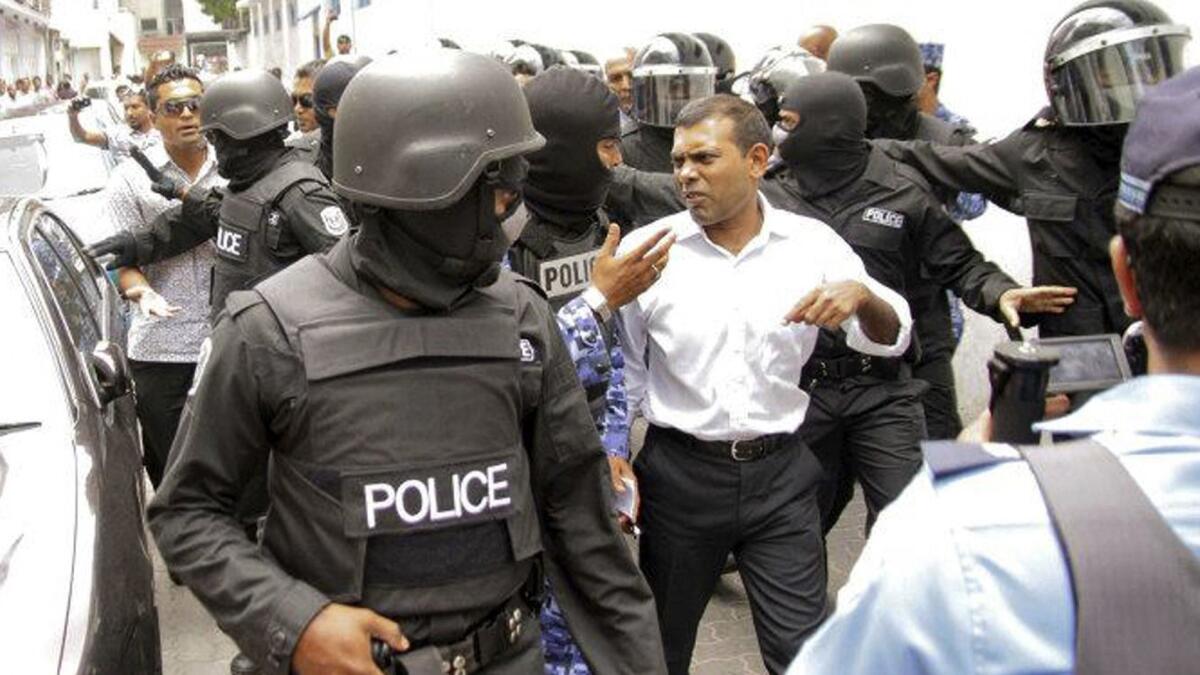
Nasheed was eventually vindicated in the fight against climate change, with once intransigent polluters like India having recently made ambitious commitments to renewable energy. The issue that animates him now is more proximate: growing indebtedness to China.
Under Chinese President Xi Jinping’s Belt and Road Initiative — a sprawling network of infrastructure projects in more than 60 countries aimed at projecting Chinese influence across the world — Beijing has financed the rebuilding of the Maldives’ airport, construction of a mile-long bridge and other massive projects under loan terms that Yameen’s government has not disclosed.
South Asia badly needs investment in roads, ports and railways. But the Maldives is among eight countries that are at severe risk of insolvency because of Belt-and-Road related debts, according to the Center for Global Development, a Washington think tank.
Nasheed said that by 2020 the Maldives would owe China $675 million — more than two-thirds of government revenue that year. Government officials insist they can repay the loans.
Yameen’s government has also leased at least seven islands to China to develop resorts and other projects. Accusing Beijing of a land-grab, Nasheed has said the real number is as high as 17, alarming environmental activists who say construction will destroy the archipelago’s delicate reefs. Indian analysts worry that Beijing could build security outposts at New Delhi’s doorstep.
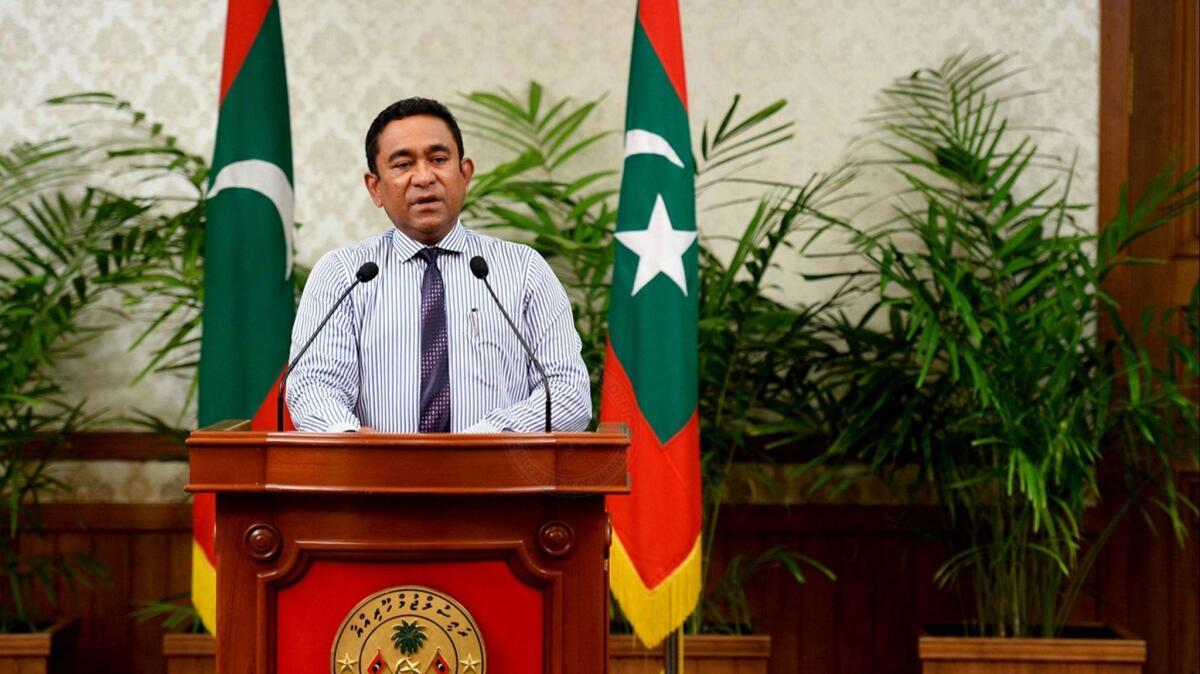
Nasheed said that Chinese support has eroded Indian influence and given Yameen political cover, just as it has with Cambodia, Myanmar and other regional allies of Beijing that are facing allegations of human rights abuses. China has a long-standing policy of “non-interference” in other countries’ internal affairs.
“If you look at all these countries, what’s happening to democracy and elections, you’ll see a pattern where we are losing it because China is so heavily engaged — and also because the United States is not focused on it,” he said.
U.S. officials say it’s not clear that China has nefarious objectives. Even some of Nasheed’s allies question whether it would be better for him to cultivate ties with Beijing, arguing its support for Yameen isn’t ironclad.
“China needs a stable, reliable friend in the Indian Ocean — they don’t need a madman,” Shaheed said.
Nasheed also accused Yameen of fanning Islamic fundamentalism in the Maldives, where Sunni Islam is the only authorized religion. More than 200 Maldivians have left the islands to join Islamic State, according to terrorism analysts. Last year, a blogger who had criticized extremists was found stabbed in Male, a killing that remains unsolved.
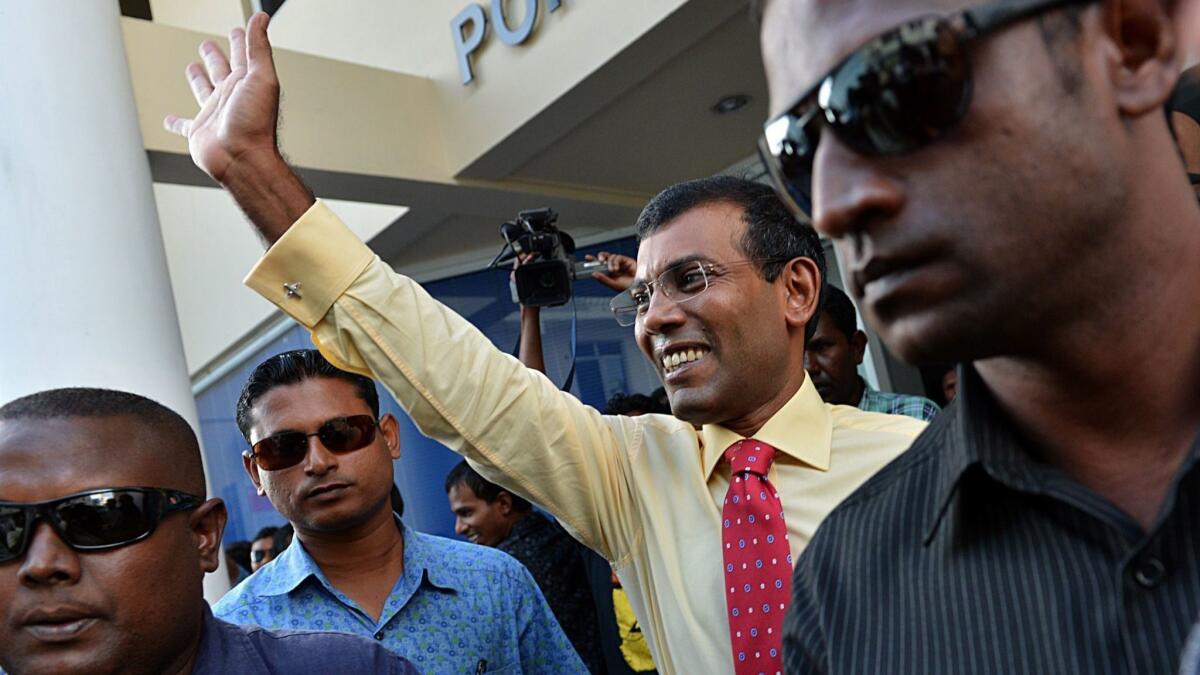
Nasheed’s detractors have portrayed him as anti-Islamic and mocked his relations with Western leaders like former British Prime Minister David Cameron, who once called him “my new best friend.”
His international stature could protect him if he returned to the Maldives, but he might not be safe even in Colombo. Last year, a Maldivian diplomat in Sri Lanka described Nasheed as a fugitive and threatened to arrest him personally, a move that Nasheed’s lawyers said would be illegal. A few months later, Nasheed canceled an event with supporters in Colombo after receiving death threats.
He said the long struggle has weighed on his family, especially his wife, Laila, who never wanted him to go into politics.
“It really hasn’t been easy for her,” Nasheed said. “But one track leads to another, and I’ve been gradually pushed into this position step by step. I must keep going. I don’t think I have the freedom, or the nicety, to keep quiet.”
Shashank Bengali is South Asia correspondent for The Times. Follow him on Twitter at @SBengali
More to Read
Sign up for Essential California
The most important California stories and recommendations in your inbox every morning.
You may occasionally receive promotional content from the Los Angeles Times.










